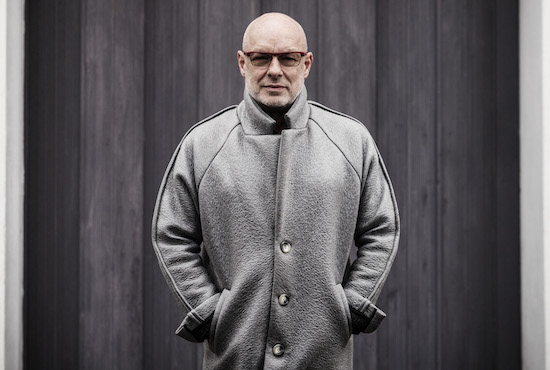Photograph courtesy of Shamil Tanna
I’ve only been to Brian Eno’s studio in West London on a few occasions, but each time it’s been in an entirely different configuration. My visits have never been in particularly quick succession, so perhaps that’s not a surprising thing to experience. However it does tell you a lot about how the ergonomics of Eno’s workspace affect each of his projects. Eno’s method and output is one of challenging and reshaping the space in which things exist. For a long time now his ambient music has decorated and enhanced spaces and the objects within them from airports to, more recently, hospital wards.
His latest album, The Ship, is a stereophonic condensation of a project based on a surround-sound experience, where different sizes and types of speakers would be placed in such a way as to make the listener feel like they’re living within the song. It marked a prominent return of Eno’s voice as one of the central objects of the composition, something that, before his recent work with Karl Hyde, we haven’t really heard from him in over ten years since the album Another Day On Earth. Eno says of the project: "I wanted to make a record of songs that didn’t rely on the normal underpinnings of rhythmic structure and chord progressions but which allowed voices to exist in their own space and time, like events in a landscape. I wanted to place sonic events in a free, open space."
It’s interesting that someone who thinks so much about the voice, and who is such a keen and passionate singer, has only used it in their work sparingly over the last 35 years, and this makes it stranger still to find out that most of his choices for this feature end up being preoccupied with the idea of the voice and its many uses and representations. There’s plenty of treatment on Eno’s voice in parts of his new album, and it is an instrument that is often used in non-conventional ways, at least until the final track, ‘I’m Set Free’, which is a very straight-up and considered cover of The Velvet Underground. To hear his voice in such clarity and range here for the first time in ages, reinterpreting this song and completely making it his own, has proved to be one of the musical highlights of the year for me, and I think perhaps a career highlight for Eno himself. Indeed, the whole album feels like one of the strongest, most realised and adventurous albums in his canon.
When I arrive this time, Brian is rooting around his record collection and an incredible gospel song is blasting out over the studio. The lead voice is very high pitched and possesses a great clarity, but also a vibrato, that immediately grabs me. The soft gradations of colour from some of Eno’s light boxes flow in unsynchronised orders at one side of the room, and my whole experience and sense of space immediately feels shifted. To think that I was walking from a chaotic Notting Hill Gate Tube station mere minutes ago feels odd, given that I now suddenly feel so divorced from the rest of the city.
There’s very little clutter in Eno’s studio. There are a lot of things – records and books, bits of artwork, effects pedals, a giant spanner, a gun where the barrel is a penis – but it never feels disorganised or cluttered. There also always seem to be a few people around and doing things, somewhat giving the impression that you’ve accidentally arrived on the wrong day and you’re barging into another meeting. This isn’t the case, of course. It’s just that there’s always work to be done and people to be doing that with – a great openness, stillness even, at play with a constant flurry of creativity is how the studio has always seemed to me.
Throughout the course of our conversation, Brian selects tracks to play out from his fairly extensive vinyl and CD collection. He has piles of things that amount to more than we have time for today, which unfortunately means that, although included for possible selection in this feature – and played for us to listen or sing along to – we don’t get a chance to delve into Neu! 2 or CrazySexyCool by TLC. A lot of the time it turns out that we could do an entire feature on one particular singer or bass player, or one particular idea. Brian doesn’t just seemingly have a wide taste in music, but also a very large breadth of understanding about each thing he likes, both theoretically and historically.
A lot of the choices here end up being considerations on one song as opposed to whole albums, and so I prefer to see it as less of a definitive favourite albums list, and more of a piece where the records are selected to discuss other ideas.
The Ship is out on April 28 via Warp. Click on his image below to begin scrolling through Brian’s choices, which run in no particular order


